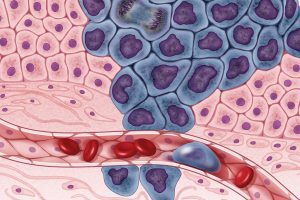what is cancer and how does it manifest itself?
The cells in the human body are constantly multiplying and replacing old cells in the body. When a cell divides it replicates everything within the cell including the DNA. Occasionally the cell will incorrectly replicate the DNA, usually this leads the cell to destroy itself, but, if the DNA within the cell does not instruct the cell to self-destruct, the cell will continue to multiply, causing a tumour. Cells from the tumour may travel to other parts of the body, which can lead to secondary cancer, eventually culminating in death (Galsky, 2010).
The role of the immune system
The immune system also provides a way of repressing cancer cells. Several types of white blood cells are effective for fighting against tumours. B-cells, CD4 helper T cells, dendritic cells and microphages (Cancer Research Institute, 2019). However, sometimes a tumour cell will evolve in a way that fighter white blood cells cannot recognise it as harmful to the body, It attracts immune cells that repress the immune response, the tumour cell then multiplies eventually leading to a tumour the immune system is unable to fight (Nature, 2015).
How can we prevent cancer and strengthen the immune system?
The American Cancer Society (2020), suggests several initiatives we can do to reduce our chances of developing cancer.
- Stay at a healthy weight, being overweight correlates with an increased chance of developing cancer.
- Regularly take part in physical exercise, this might be hours walk, running, swimming, cycling etc.
- Eats a healthy diet of vegetables, fruit and wholegrains.
- Cut out or eat only occasionally red meat, processed meat, sugar, highly processed foods.
- If you do cook food poach, bake or broil it rather then frying or grilling it.
- Avoid highly processed foods, high in sugar.
- Eat smaller portions.
- Drink alcohol only moderately and rarely.
- Cover up when going out in the sun to prevent sunburn.
Additionally, we can make a habit of including herbs and spices in our food that may prevent cancer.
- Turmeric- At study done by Azuine and Bhide (1994) found dietary turmeric decreased the prevalence of tumours in Syrian
- Garlic- A review of current research by Fleischauer & Arab, (2001) concluded there was a ‘preventative effect of garlic consumption in stomach and colorectal cancers.’
- Ginger-Shukla and Singh (Shukla & Singh, 2006) found that studies showed strong evidence it was anti-cancerous.
- Black Pepper- It helps support the immune system, thereby assisting the immune system to fight against cancer (Majdalawieh & Carr, 2010).
- Ashwagandha-Researchers (Widodo, et al., 2010) have found that Ashwagandha helps the body to conquer and rid the body of cancer cells.
- Cayenne pepper contains capsaicin which evidence has shown have anti-cancer properties (Clark & Lee, 2016).
- Carvacrol is in the herb’s marjoram, mint, thyme, basil, parsley. Scientists found it is toxic to cancer cells (Mehdi et al, 2011). Covering foods in herbs may also reduce cancer causing chemicals that are produced when meat is cooked at high temperatures (Smith, et al., 2008).
References
American Cancer Society, 2020. Diet and physical activity. What’s the cancer connection. [Online]
Available at: https://www.cancer.org/cancer/cancer-causes/diet-physical-activity/diet-and-physical-activity.html
[Accessed 13 July 2020].
Azuine & Bhide, 1994. Adjuvant chemoprevention of experimental cancer: catechin and dietary turmeric in forestomach and oral cancer models. Journal of Ethnopharmacology, 44(3), pp. 211-217.
Clark, R. & Lee, S., 2016. Anticancer Properties of Capsaicin Against Human Cancer. International journal or cancer research and treatment, 36(3), pp. 837-843.
Fleischauer & Arab, L., 2001. Garlic and Cancer: A Critical Review of the Epidemiologic Literature. The journal of nutrition, 131(3), p. 1032S–1040S.
Galsky, M., 2010. Everything you need to know about cancer. In: London: Jones and Bartlett.
Majdalawieh, A. & Carr, R., 2010. In Vitro Investigation of the Potential Immunomodulatory and Anti-Cancer Activities. Journal of Medicinal food, 13(2), pp. 371-381.
Mehdi et al, S., 2011. Cytotoxic effect of Carvacrol on human cervical cancer cells. Biology and medicine, 3(2), pp. 307-312.
Nature, 2015. Tumour immunology and immunotherapy. [Online]
Available at: https://www.youtube.com/watch?v=K09xzIQ8zsg
[Accessed 13 July 2020].
Shukla, Y. & Singh, M., 2006. Cancer preventive properties of ginger: A brief review. Food and Chemical Toxicology, 45(2007), pp. 683-690.
Smith, J., Ameri, F. & Gadgil, P., 2008. Effect of Marinades on the Formation of Heterocyclic Amines in Grilled Beef Steaks. Journal of food science, 73(6), pp. T100-T105.
Widodo, N. et al., 2010. Selective Killing of Cancer Cells by Ashwagandha Leaf Extract and Its Component Withanone Involves ROS Signaling. Plosone, 5(10), pp. 1-8.

